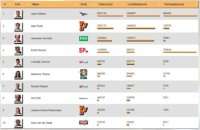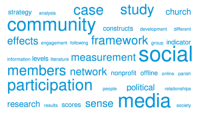New website compares the influence of individuals on social media

Dutch social media expert Robin Effing, doctoral degree candidate at UT CTIT research institute and lecturer at the Saxion Academie voor Creatieve Technologie, has collaborated to develop a program that has been christened Social Indicator and which can objectively compare the influence of individuals on Social Media. An initial demo of the program is launched, which compares the influence of 34 Dutch politicians. A demo version will soon be available in which everyone can fill in their own profile. The program stems from research for which Effing obtained his doctoral degree at the University of Twente on 12 November.
There are many programs that identify how often certain persons and organizations are mentioned on social media. However, these do not reflect what the real impact of this person or organization is on social media. With the program developed by Effing, you can for the first time objectively compare the influence of individual users. The first demo of the Social Indicator compares the influence of 34 Dutch ministers, secretaries of state and party leaders on Twitter, Facebook and YouTube. The demo can be found on www.socialindicator.nl.
One of the results of this analysis is that Geert Wilders has the widest reach and the most influence on the social media. The reasons for this are that he has more than 350,000 followers on Twitter alone and that his posts are the most frequently shared. A post on Twitter in which Wilders argues that Zwarte Piet, the companion of Saint Nicholas, should stay was recently shared 2640 times, for example. The top 25 with tweets that are shared most, only contains posts by Wilders.
Social indicator
The basis for the Social Indicator is a scientific method developed by Effing, which among other things compares the number of posts, tweets and videos with the social network of the user in the form of the number of followers, page likes and subscribers. Furthermore, the program takes account of the interaction on the basis of the comments, responses, retweets and shares..

According to Effing, the Social Indicator can set a new standard for research in the field of social media. "With the program, we are able to compare the mutual use and the influence of individuals in a controllable and transparent manner."
The software and the demo will be developed by the company eLABBS in collaboration with Saxion and the University of Twente. The method of analysis and the basic version of the program will be made available to everyone free of charge and will ultimately be supplemented with specific premium services for the business community. A demo version in which everyone can enter their own profile will be launched in a few months.
Doctoral research
The Social Indicator stems from the doctoral research of Robin Effing, in which he looked at the strategic use of social media in non-profit organizations, such as churches and political parties. Effing specifically examined the effects of the use of social media by these organizations on the participation of their members.
More information: The demo can be found on www.socialindicator.nl.
Provided by University of Twente




















